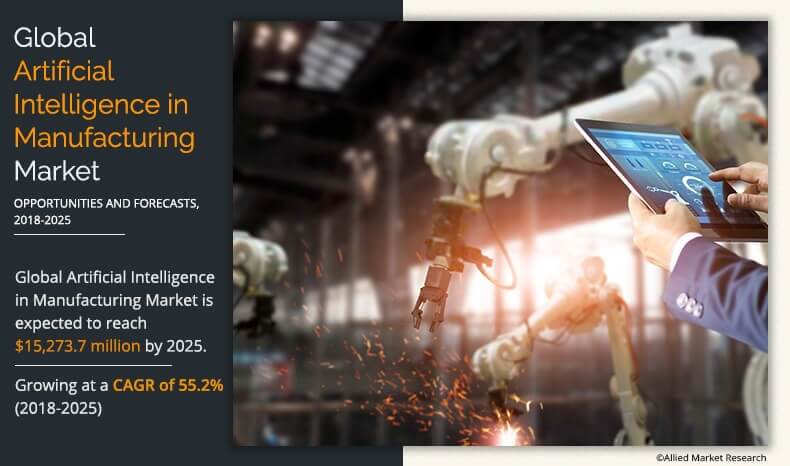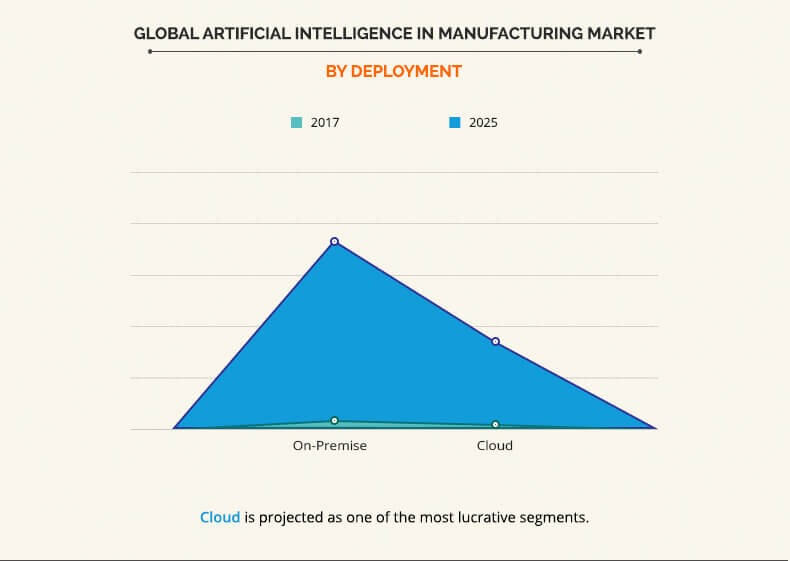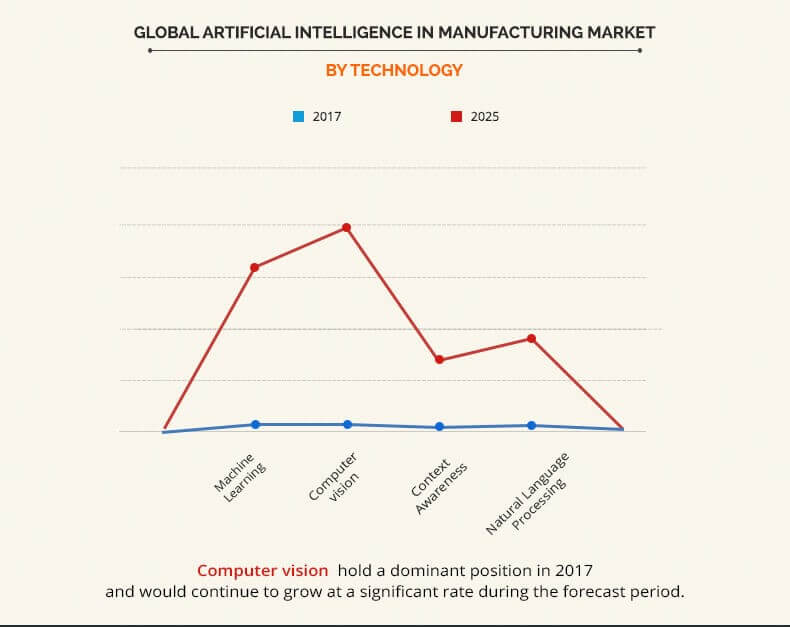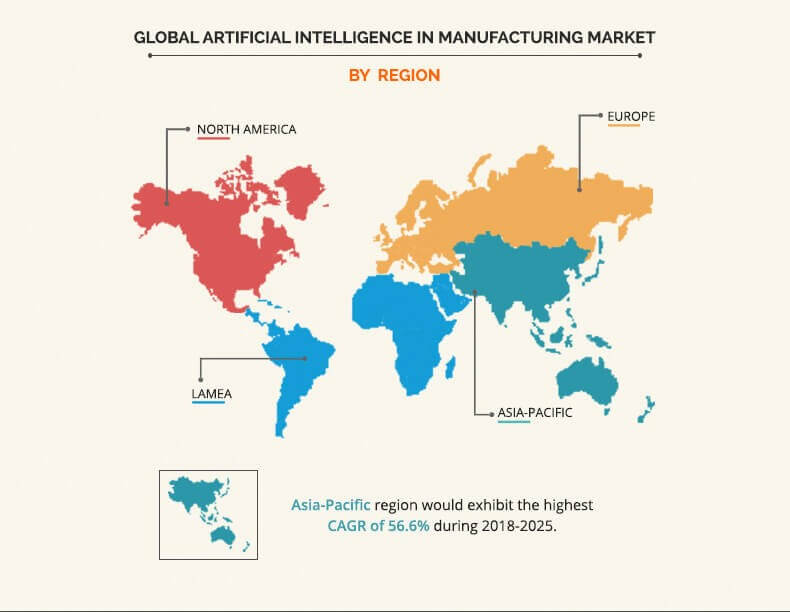Artificial Intelligence in Manufacturing Market Statistics, 2025
Artificial intelligence has been one of the fastest-growing technologies in the recent years. AI is associated with human intelligence with alike characteristics such as language understanding, reasoning, learning, problem solving, and others. Manufacturers in the market witness massive underlying intellectual challenges in the development and revision of such a technology. AI is positioned at the core of the next gen software technologies in the market. The global artificial intelligence in manufacturing market size was $513.6 million in 2017, and is projected to reach $15,273.7 million in 2025, growing at a CAGR of 55.2%.
Enhancement in automation in the manufacturing industry and rise in demand for big data integration boost the growth of the artificial intelligence in manufacturing market. In addition, widespread usage of machine vision cameras in manufacturing applications, such as machinery inspection, material movement, field service, and quality control drive the growth of the artificial intelligence in manufacturing market. Moreover, key market players are adopting various strategies such as product launch and product innovation, to expand their existing product portfolio and maintain competitiveness in the rapidly growing AI marketspace. For instance, in October 2017, Oracle launched new artificial intelligence-based apps for supply chain, manufacturing, and other professionals. In 2018, IBM launched AI-powered Watson Assistant for businesses. This product is a smart enterprise assistant powered with artificial intelligence (AI) features.
The practice of using AI in the supply chain of manufacturing firms can estimate demand patterns for products across time, socioeconomic segments, and geographical markets. Moreover, major brands are making AI a crucial part of their system to improve customer satisfaction. For instance, GE launched Brilliant Manufacturing Suite to allow customers to realize their own vision of a Brilliant Factory. Furthermore, with the use of automation and big data in the manufacturing industry, risks during manufacturing processes are reduced and customers can get answers on an immediate basis, thereby enhancing the customer experience. However, in the coming future, several human jobs are expected to be substituted by AI-based technology systems globally. According to researchers of the Oxford Martin School, around 47% of the total U.S. employment is at risk owing to the influence of advances in AI. Thus, AI possesses a great threat to humanity, thereby hampering growth of the artificial intelligence in manufacturing market.
The global artificial intelligence in manufacturing market is segmented based on deployment, technology, application, industry, and region. Based on deployment, the market is bifurcated into cloud and On-Premise. The On-Premise segment is anticipated to dominate the global artificial intelligence in manufacturing market throughout the study period. By technology, the market is divided into machine learning, computer vision, context awareness, and natural language processing. The computer vision segment is anticipated to dominate the global artificial intelligence in manufacturing market throughout the study period. Based on application, the market is categorized into material movement, predictive maintenance, and machinery inspection, production planning, field services, and quality control & reclamation. The predictive maintenance and machinery inspection segment is projected to dominate the global artificial intelligence in manufacturing market in the near future. Based on industry, the market is classified into semiconductor & electronics, energy & power, pharmaceuticals, automobile, heavy metals & machine manufacturing, and others. The automobile segment is projected to dominate the global artificial intelligence in manufacturing market in the near future.
By Deployment
By deployment, the market is bifurcated into cloud and on premise. Among these, the On-Premise segment is expected to dominate the artificial intelligence in manufacturing market in terms of revenue during the forecast period.
By Technology
By technology, the market is segmented into machine learning, computer vision, context awareness, and natural language processing. Among these, the computer vision segment is expected to dominate the artificial intelligence in manufacturing market in terms of revenue during the forecast period.
By Region
The artificial intelligence in manufacturing market is analyzed across North America, Europe, Asia-Pacific, and LAMEA. Among these, North America holds a significant share in the global artificial intelligence in manufacturing industry, and Asia-Pacific is projected to register the highest CAGR of 57.2%, followed by North America. North America possess high growth potential, due to increase in adoption of industrial robots in the manufacturing sector of the region.
Covid-19 Impacts on Artificial Intelligence in Manufacturing Market-
- The global lockdown has impacted the manufacturing industry badly. And, as a result, the use of artificial intelligence in the sector has also been disrupted to some extent.
- On the other hand, the benefits of AI have worked as a crisis management tool for a number of manufacturing ventures. With the help of AI, countries have been able to categorize patterns from big data, support people’s health systems and control the spread to a certain point. Also, a number of applications have been manufactured to brace the entire system.
Key Benefits for Artificial Intelligence in Manufacturing Market :
The study provides an in-depth analysis of the global artificial intelligence in manufacturing market along with the current trends and estimations to elucidate the imminent investment pockets.
Information about the key drivers, restraints, and opportunities and their impact analysis on the market size is included in the study.
Porter’s Five Forces analysis illustrates the potency of the buyers and the suppliers operating in the industry.
The quantitative analysis of the global market from 2017 to 2025 is provided to determine the market potential.
Artificial Intelligence in Manufacturing Market Report Highlights
| Aspects | Details |
| By Deployment |
|
| By Technology |
|
| By Application |
|
| By Industries |
|
| By Region |
|
| Key Market Players | NVIDIA CORPORATION, MITSUBISHI ELECTRIC CORPORATION, MICROSOFT CORPORATION, SIEMENS AG, INTEL CORPORATION, INTERNATIONAL BUSINESS MANAGEMENT CORPORATION, GENERAL ELECTRIC COMPANY, ROBERT BOSCH GMBH, ORACLE CORPORATION, CISCO SYSTEMS, INC. |
Analyst Review
Artificial intelligence in manufacturing refers to the replication of human intelligence into machines with the help of sophisticated machine learning, cognitive computing, machine vision, and natural language processing algorithms that help increase productivity, reduce errors, and facilitate mass production. Thus, this technology finds its wide applications in machinery inspection, quality control, and others. In addition, rise in demand for analytical instrumentation in various areas such as life science instrumentation, molecular spectroscopy, and others is expected to fuel the growth of the artificial intelligence in manufacturing market.
The market players have developed advanced technologies such microcontrollers, AI chips, and others to improve efficiency and productivity of manufacturing processes through the implementation of artificial intelligence. Thus, boosting the demand for artificial intelligence in manufacturing. For instance, Kuka introduced a series of LBR iiwa industrial robots, which are subtle, compliant, safe, precise & flexible, and is armed with machine-driven systems and drive technology for industrialized operation. Thereby, facilitating automation of delicate and complex assembly jobs in which the use of robots was earlier unimaginable.
Improved productivity and automation could be achieved with the use of AI. This drives the growth of the artificial intelligence in manufacturing market. In addition, due to the use of automation and big data in manufacturing industry, there is a decrease of risk during manufacturing processes. Also, the customer interaction is enhanced, as their questions or demands are catered immediately. This, is expected to propel the growth of the artificial intelligence in manufacturing market.
Loading Table Of Content...







